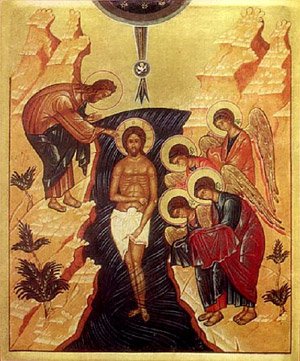News

THE HOLY THEOPHANY (BAPTISM) OF OUR LORD GOD AND SAVIOR JESUS CHRIST
05:34 PM
“The significance of Jordan cannot be overestimated, for the historical role of the river goes beyond all rational calculations,” wrote the famous archeologist Nelson Gluck about this muddy, somber, and in places dangerous river.
According to the Old Testament book of Joshua the son of Nun, stones were put into the waters of the Jordan in memory of the miraculous crossing of the Israelites across the river as though it were dry land; blessed Jerome, who lived in the Holy Land in the ninth century, testifies that these stones were still visible during his time. It was there, near Bethabara (which means ford), that the last Prophet of the passing, Old Testament, was baptizing the people. Pointing to the white slippery boulders, solemnly, he said:
“And think not to say within yourselves, We have Abraham to our father: for I say unto you, that God is able of these stones to raise up children unto Abraham” (Matthew 3:9).
However, according to other commentaries, the Baptist, by stones, meant the gentiles, yet it is difficult to understand where, in the crowd surrounding the prophet, could be found any noticeable number of those, who did not keep the law of Moses. One way, or another, yet the pilgrims used to carry away, and they do it to this day, from the holy river broken pieces of stone, filed and rounded by the streams of Jordan’s waters; and are not all of us made sons unto Abraham out of them?
“Water is the beginning of the world, Jordan is the beginning of the Gospel”, says St. Cyril of Jerusalem. As in the second verse of the book of Genesis, on the day of the Baptism, the Spirit of God once again was hovering over the water, over the wet brown (“which reached to extremities” – church historian Nicephoras Callistos) hair of Christ, and God the Father, Himself, the Lord of Hosts, in the expression of one of the contemporary church author, did not hold back and exclaimed: “This is My beloved Son, in Whom I am well pleased!”
In the year 28, having come to Bethabara, which was located a few kilometers away from the Dead Sea, the Lord knew “what He was doing, and what He was doing it for” (Prot. A.V. Gorskiy). “Jesus Christ asks for baptism for Himself, as a symbol of the repentance for the sins of mankind,” we read in one of the festive homilies. However, is it correct here, is it applicable here, the very meaning of the symbol?
“He comes to the waters of the Jordan in order, to wash the sins of publicans and sinners, says St. John Chrysostom, oh, the new wonder! Oh, the unspeakable grace! Christ completes the feat, yet I receive the honor; He struggles with the devil, yet I am the victor; He is baptized, yet the defilement is removed from me…”
And the Forerunner, filled with the prophetic spirit, knows that now, before his eyes, the Lamb of God takes upon Himself the sins of the world, and, as a man, he tries to halt Him:
“I must be baptized by Thee, and comest Thou to me?!” (Matthew 3:14)
Three years later, His Apostle Peter asked Him in the same way:
“Lord! Dost Thou wash my feet?” (John 13:6)
The answer was similar: “Suffer it to be so now: for thus it becometh us to fulfil all righteousness.” Thus did the Lord answer John the Forerunner. And here is the answer for Peter: “What I do thou knowest not now; but thou shalt know hereafter” (John 13:7).
John agrees right away, the disciple first argues, but in both cases the Gospel ministry of Christ is fulfilled to the end.
“…St. Paisios the Great prayed for his disciple, who renounced Christ, and when he was praying, the Lord appeared to him and says: “Paisios, for whom are you praying, he renounced me?” Yet the saint continued to pity his disciple and then the Lord said to him:
“Paisios, you became like unto Me through love.”
Thus is peace acquired and apart from this, there is no other way” (St. Silouan of Athos. About peace).
Christ, in the words of the same St. Silouan, was “sorrowful for the people to such an extent,” that He went to the death on the cross for their sake.
Here, on the Jordan was the beginning of the way of the cross, the way that leads to Golgotha and Resurrection.
“The voice of the Lord upon the waters is crying out, saying: come, receive ye all the Spirit of wisdom, the Spirit of knowledge, the Spirit of the fear of God, of Christ manifest. Today the nature of water is sanctified, and the Jordan is parted, and it turns the streams of its waters, beholding the Master being baptized” (from the service of the feast).






